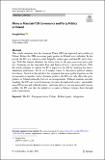Files in this item
Menu or mandate? EU governance and party politics in Poland
Item metadata
| dc.contributor.author | Hou, Pengfei | |
| dc.date.accessioned | 2020-04-24T12:30:02Z | |
| dc.date.available | 2020-04-24T12:30:02Z | |
| dc.date.issued | 2020-04-22 | |
| dc.identifier | 267395349 | |
| dc.identifier | 0a79aba5-522f-446f-b3c7-0493d2e6c419 | |
| dc.identifier | 000528105000001 | |
| dc.identifier | 85084122501 | |
| dc.identifier.citation | Hou , P 2020 , ' Menu or mandate? EU governance and party politics in Poland ' , Chinese Political Science Review , vol. First Online . https://doi.org/10.1007/s41111-020-00147-0 | en |
| dc.identifier.issn | 2365-4244 | |
| dc.identifier.uri | https://hdl.handle.net/10023/19853 | |
| dc.description | This study was funded by China Scholarship Council (No. 201708060001). | en |
| dc.description.abstract | This article examines how the European Union (EU) has impacted party politics in Poland. Before the 2004 accession, party politics in Poland were turbulent. In this period, the EU, as a reference point, helped to create a pro- and anti-EU party cleavage. With this impact admitted, the article turns to the post-accession party politics. Centering on the nationalist Law and Justice (Prawo i Sprawiedliwość, PiS), the article attempts to explore the EU’s impact on the PiS by studying the latter’s adaptation preferences. To do so, I employ James N. Rosenau’s political adaptation theory. Central to the article is the argument that since political parties are the protagonists in member states’ domestic politics, the EU can only affect the party politics in Poland indirectly, but not inconsequentially. Without mandate notwithstanding, the EU can create bottom-up pressures through civil society; meanwhile, since EU norms and political parties’ particular interests are not necessarily incompatible, the EU can take the initiatives to make a balance between them through policy innovations. | |
| dc.format.extent | 20 | |
| dc.format.extent | 687118 | |
| dc.language.iso | eng | |
| dc.relation.ispartof | Chinese Political Science Review | en |
| dc.subject | The EU | en |
| dc.subject | Europeanization | en |
| dc.subject | Poland | en |
| dc.subject | Political party | en |
| dc.subject | Adaptation | en |
| dc.subject | JZ International relations | en |
| dc.subject | JA Political science (General) | en |
| dc.subject | DAS | en |
| dc.subject.lcc | JZ | en |
| dc.subject.lcc | JA | en |
| dc.title | Menu or mandate? EU governance and party politics in Poland | en |
| dc.type | Journal article | en |
| dc.contributor.institution | University of St Andrews. School of International Relations | en |
| dc.identifier.doi | 10.1007/s41111-020-00147-0 | |
| dc.description.status | Peer reviewed | en |
This item appears in the following Collection(s)
Items in the St Andrews Research Repository are protected by copyright, with all rights reserved, unless otherwise indicated.

